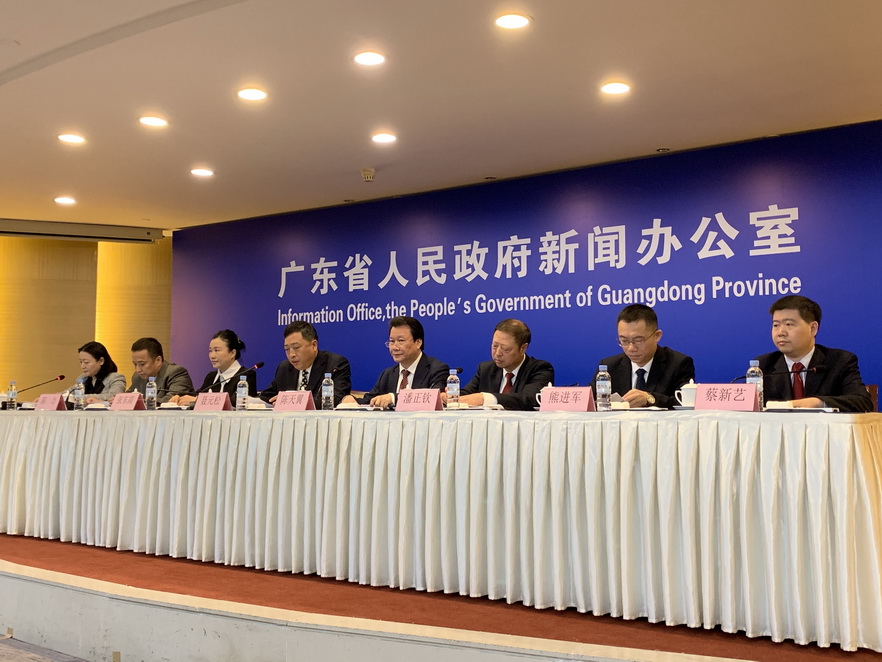The Information Office of Guangdong Provincial People's Government held a press conference on Measures to Accelerate the development of elderly care services in Guangzhou, capital of Guangdong Province, Dec. 24, 2018. The press conference introduced the background, main contents and highlights of innovation of the Measures, and answered questions from journalists.

"Measures" on November 1, 2019, the provincial government executive meeting, review and principles through November 14, in the name of the guangdong provincial government office issued by the, is the implementation of the xi jinping, general secretary of the spirit of important instructions instructions and relevant national pension service policy deployment of specific measures, is also a crack in the current endowment service development, prominent contradiction and the bottleneck problem, The important institutional arrangements to promote the high-quality development of old-age services in Our province.
"Some Measures" has formulated 27 measures in 8 aspects to accelerate the development of elderly care services in Our province, highlighting 4 focuses: to meet the needs of the masses, to solve the bottleneck of development, to optimize the development environment, to improve the quality of service, and to constantly meet the diverse and multi-level elderly care service needs.
Focus on meeting the needs of the masses
We will accelerate the development of home-based community elderly care services
To address the practical needs of about 97% of the elderly who choose home care and community care
In view of the desire and realistic demand of more than 97% of the elderly in Our province to choose home care and community care for the elderly, "Some Measures" puts accelerating the development of home care services in the first place, and puts forward specific measures such as strengthening service network, strengthening service guidance, strengthening standardized management, supporting integrated development and paying attention to care services. It is proposed that by 2022, a community 15-minute home care service circle and an emergency rescue system for home care in the community should be basically established. We will strive to establish at least one home-based community service institution for the elderly in all streets and towns where conditions are available, providing comprehensive services such as full care, day care, door-to-door service, and guidance for the elderly, so as to provide diverse services for the elderly accessible nearby; A system of regular visits for the elderly in home-based communities has been established at the county level, with a focus on the elderly with special difficulties, such as empty nests, left-behind families, disabled people, severely disabled people, and special family planning families. The monthly visit rate of the elderly with special difficulties has reached 100 percent.
Focus on solving bottlenecks in development
It is difficult to plan, use land and employ people
Breakthrough to solve the bottleneck barriers that hinder the development of pension institutions in recent years
Cracking "Planning Difficulties"
All localities are required to draw up special plans for elderly care facilities for listed counties (cities and districts), which will be incorporated into the overall and detailed plans for territorial space. At the same time, it is clear that new residential areas should be built at least 20 square meters for every 100 households.
Crack "land use difficulty"
If a non-profit endowment service institution is to be established, it can apply for land allocation by presenting the social service institution registration certificate and other legal materials issued by the registration authority. Encourage the integrated utilization of idle resources. For the reconstruction and utilization of existing idle facilities in cities and the construction of buildings on rural collective land to set up old-age service institutions, they can be used as old-age facilities first, and then change the nature of land use.
Crack down on "short lease period of public property"
At present, the lease term of state-owned assets in administrative institutions is not more than five years in principle, which greatly restricts the investment of social forces and the stability of the operation of pension institutions. Some Measures break through policy barriers, proposing to give priority to unused public property for pension services, and extend the lease term to 15 years.
Crack the "hard to Employ people"
We will promote multi-level personnel training for elderly care services, and support colleges and universities in establishing majors related to elderly care services. We will expand the scale of training on daily care skills for the elderly, with 40,000 nursing and management staff trained annually from 2020 to 2022. Excellent talents will be given preferential policies in terms of residence settlement, housing security and children's schooling.
Crack the "fire inspection difficulty"
For the rural nursing homes for the elderly that meet the fire safety requirements but fail to pass the fire inspection due to the lack of real estate registration, land planning and other procedures, and the existing old-age care institutions that use the stock of property, all county (city, district) governments are required to seriously study and deal with them, and optimize the inspection procedures on the premise of ensuring safety.
Focus on optimizing the development environment
Releasing policy dividends to stimulate market vitality
We will promote the orderly participation of nongovernmental forces in the development of elderly care services
Strengthening policy Guidelines
By the end of June 2020, local governments are required to publish a list of policies and measures, supply and demand information or investment guidelines for supporting elderly care services in their respective administrative regions, to provide policy guidelines for nongovernmental investment.
Relax industry access
We will support private elderly care institutions and service enterprises in setting up branches in accordance with the law. Non-profit pension institutions can set up a number of service outlets without legal person status within the jurisdiction of their registration and administration authorities. The "two certificates of approval and practice registration" shall be integrated for the elderly care institutions that have set up secondary and lower medical institutions (excluding emergency centers, first aid stations, clinical laboratory centers, sino-foreign joint venture medical institutions, Hong Kong, Macao and Taiwan sole proprietorship medical institutions).
We will cut taxes and fees
Pension service institutions enjoy relevant tax incentives according to current policies. Institutions providing elderly care and household services to communities will enjoy preferential tax policies in terms of value-added tax, corporate income tax, deed tax, property tax, urban land use tax and real estate registration fee. Residential pricing policies will be adopted for electricity, water and gas consumption in service places of elderly care institutions.
We will expand channels for investment and financing
We will expand investment and financing channels and encourage qualified financial institutions to invest in the old-age care industry. We will explore ways to allow for-profit pension institutions to use assets such as land and facilities they have acquired for payment as collateral for financing. We will encourage enterprises, charitable organizations and individuals to set up charitable trusts for the elderly and carry out charitable projects for the elderly. Support the development of the elderly care industry, and strive to cultivate no less than 10 brand, influential and large-scale new old-age care industry groups in the province by 2022.
Focus on improving service quality
We will improve service quality and strengthen industry supervision
We will vigorously improve the quality of elderly care services
We should adhere to the public welfare nature of public pension institutions. In addition to giving full play to the role of public pension institutions and public and private pension institutions in providing support for those in need, other beds should be allowed to be opened to the public. We should study and formulate policies to guide fees, in which the benefits of public pension institutions should be used to support the elderly services of those in need. We will explore ways to transform government-run old-age care institutions where conditions permit into state-owned old-age service enterprises.
A three-year project will be launched to transform and upgrade services for people in extreme poverty (nursing homes). By the end of 2022, every county (city, district) will have at least one county-level service facility (nursing homes) that meets the three-star standard and provides professional care for disabled and some disabled people in extreme poverty.
We will strengthen funding guarantee. Starting from 2021, governments at all levels will allocate no less than 55 percent of their social welfare lottery funds to support the development of the elderly service system. We will encourage the government to purchase elderly care services, make it clear that funds needed by the government to purchase elderly care services should be included in the overall arrangement of funds for the construction of the elderly care service system, and expand the content of services purchased.
We will establish and improve the cross-departmental coordination supervision mechanism with each performing his/her duties and responsibilities, establish and improve the joint punishment mechanism, promote the honest operation of elderly care institutions and personnel, and create a fair competition, healthy and orderly elderly care market environment. We will promote the implementation of the "Southern Guangdong Homemaker" project and build a well-known brand of elderly care service industry with Guangdong characteristics.
相关推荐
- Shaanxi holds the second quarter government bank enterprise docking meeting for the elderly care industry 2025-06-28
- Announcement of Volunteer Recruitment for the "Silver Age Action" in the New Era of Xi'an City 2025-06-04
- Xi'an, Shaanxi: Welfare policies for the elderly are all here 2025-05-22
- Notice from the Civil Affairs Bureau and Finance Bureau of Xi'an City on Promoting the Promotion and Application of Smart Health Elderly Care Products 2025-04-11

